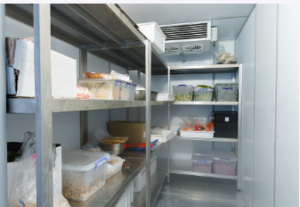Types of Industrial Refrigeration Compressors
Industrial refrigeration VIC systems are crucial to the food and beverage, pharmaceutical, and chemical manufacturing industries. They help to maintain consistent temperatures during storage and transportation, preventing bacterial growth.
 Performing maintenance on these systems can be difficult and time-consuming. It is why it is essential to use a company with extensive experience in industrial refrigeration.
Performing maintenance on these systems can be difficult and time-consuming. It is why it is essential to use a company with extensive experience in industrial refrigeration.
Compressors
At the heart of every mechanical refrigeration system is the compressor. It draws in low-pressure vapour from the refrigerant evaporator and discharges high-pressure, superheated refrigerant moisture into the refrigerant condenser. There are many different industrial refrigeration compressors, each designed for a specific range of applications and refrigerants. These include:
Reciprocating, rotary screws and centrifugal compressors are the most common choices for industrial refrigeration applications. Each type has its advantages and disadvantages, but all work to elevate the pressure of the refrigerant gas as it flows through the refrigeration cycle.
Compressors are the engine of the entire industrial refrigeration process, and they must be sized correctly to achieve the best results. A too-small compressor will struggle to perform consistently, while a too-large compressor will be inefficient and expensive.
Rotary screw compressors use a pair of meshing rotors to compress the refrigerant gas between them. They produce a higher pressure level for a given amount of gas than reciprocating compressors, and they consume less energy. They also have fewer moving parts, which reduces maintenance costs and operating expenses. However, they do have the drawback of being less forgiving in dirty environments, and they are typically limited to smaller volumes of refrigerant.
Another option is the rotary vane compressor. It uses a spring-loaded vane to separate the suction and discharge phases of the compressor. It has the advantage of allowing easy access to the compressor but can also suffer from back leakage.
Centrifugal compressors elevate the refrigerant pressure by imparting kinetic energy through an impeller. These are the most common and robust industrial refrigeration VIC compressors, but they can be challenging to install in tight spaces. They can also experience issues like overheating, damaging them and lowering their efficiency and life expectancy.
Consider a remanufactured industrial compressor if you’re looking for a cost-effective, durable solution for your refrigeration needs. These machines provide the excellence of a new compressor, but at a fraction of the price and often with delivery weeks sooner. They’re the ideal choice for businesses that require a reliable commercial refrigeration system without breaking the bank on a replacement.
Condensers
A condenser is a crucial part of any industrial refrigeration system. It cools the refrigerant, releasing the absorbed heat into the atmosphere without disrupting the refrigeration cycle. It also helps to reduce energy consumption and improve overall system performance.
The condenser is a coil-shaped component that cools the refrigerant from its high-pressure vapour state to a liquid. The cooling is facilitated by a fan that blows ambient air across the condenser coils. As the refrigerant loses its heat, it changes from a vapour into a liquid and moves through the refrigeration system to the evaporator.
Evaporators are similar to condensers but release the absorbed heat into the environment rather than cool it. They are commonly used in warehouses and industrial walk-in freezers and can be cooled with air or water. Most industrial refrigeration systems use ammonia, a natural refrigerant with low environmental impact and less GWP than other fluorinated refrigerants.
Compressors, condensers, and evaporators are all essential components of any industrial refrigeration system. Proper maintenance is critical to ensuring the system operates as efficiently as possible. Neglecting regular maintenance can result in expensive breakdowns, product loss, and lost productivity.
The type of condenser chosen will vary depending on the application and environmental conditions. For example, a shell and tube condenser are usually used if the refrigeration system requires colder temperatures. It is more suitable for industrial freezers and coolers than air-cooled units, which are best suited for warehouses and office refrigerators. Water-cooled condensers are another option and are especially effective when the refrigeration system is located in an area with a reliable water source. Finally, evaporative condensers combine the best elements of both air-cooled and water-cooled units. They are particularly effective when the refrigeration system needs to be cooled in hot climates, where the air is humid or more desirable than usual.


